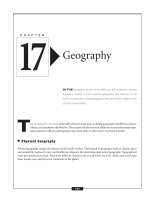Wndows to the past (social studies)
Bạn đang xem bản rút gọn của tài liệu. Xem và tải ngay bản đầy đủ của tài liệu tại đây (3.41 MB, 12 trang )
Suggested levels for Guided Reading, DRA,™
Lexile,® and Reading Recovery™ are provided
in the Pearson Scott Foresman Leveling Guide.
Windows
to the
Past
by Lana Cruce
Genre
Expository
nonfiction
Comprehension
Skills and Strategy
• Compare and
Contrast
• Main Idea
• Text Structure
Text Features
•
•
•
•
Captions
Labels
Diagrams
Headings
Scott Foresman Reading Street 2.4.1
ISBN 0-328-13279-9
ì<(sk$m)=bdchj < +^-Ä-U-Ä-U
Reader Response
Windows
1. Compare and contrast the time capsule
Dr. Jacobs put together and Garrett
Nelson’s time capsule. How are they
alike? How are they different? Use a
Venn diagram like the one below to
help you organize your ideas.
to the
Past
2. Sometimes authors use examples to tell
more about a topic. What two examples
of time capsules are given in this book?
3. Look up the word culture in your
glossary. What could you tell someone
else about your own culture?
4. Use the headings
inCruce
this book to find
by Lana
the page with information about the
pyramids.
Editorial Offices: Glenview, Illinois • Parsippany, New Jersey • New York, New York
Sales Offices: Needham, Massachusetts • Duluth, Georgia • Glenview, Illinois
Coppell, Texas • Ontario, California • Mesa, Arizona
Preserving the Past
Making a time capsule is a way to
preserve information about our culture. We
save objects that represent our life today so
that they will be discovered by people in the
future. This way, people in the future can use
the objects to study the past.
A time capsule is a special container that
holds objects from a certain time. It could be
an expensive steel box designed to preserve
valuable objects for five thousand years. It
could be as simple as a shoebox that you put
in your closet to be opened in five years.
Every effort has been made to secure permission and provide appropriate credit for
photographic material. The publisher deeply regrets any omission and pledges to
correct errors called to its attention in subsequent editions.
Unless otherwise acknowledged, all photographs are the property of Scott Foresman,
a division of Pearson Education.
Photo locators denoted as follows: Top (T), Center (C), Bottom (B), Left (L), Right (R),
Background (Bkgd)
Opener: Corbis Media; 1 ©DK Images; 3 Corbis Media; 4 (T) ©DK Images, (B) Aurora
Photos; 5 Index Stock; 6 Corbis Media; 7 Corbis Media; 8 Corbis Media; 9 ©Patrick
Ward/Corbis; 10 Corbis Media; 11 Corbis Media; 12 Corbis Media; 13 PhotoEdit; 14
©DK Images; 15 (L) Corbis Media, (C) ©DK Images, (R) Corbis Media; 16 Animals,
Animals/Earth Scenes
ISBN: 0-328-13279-9
Copyright © Pearson Education, Inc.
All Rights Reserved. Printed in the United States of America. This publication is
protected by Copyright, and permission should be obtained from the publisher
prior to any prohibited reproduction, storage in a retrieval system, or transmission
in any form by any means, electronic, mechanical, photocopying, recording, or
likewise. For information regarding permission(s), write to: Permissions Department,
Scott Foresman, 1900 East Lake Avenue, Glenview, Illinois 60025.
2 3 4 5 6 7 8 9 10 V010 14 13 12 11 10 09 08 07 06 05
3
Pyramids and Cornerstones
In some ways the Egyptian pyramids
are similar to time capsules. Scientists can
study the culture of the ancient Egyptians
by examining objects found in
pyramids.
Pyramids, however, are not
real time capsules, because
they were not supposed to be
opened. Real time capsules
are meant to be opened on a
certain date.
The pharaohs’ tombs were
not meant to be opened.
Workers laying cornerstone for the
United Nations building in New York.
Like the pyramids, cornerstones are
similar to time capsules but are not real time
capsules. People sometimes bury objects
in the bases of buildings that are being
constructed. Unlike time capsules, which are
meant to be opened, cornerstones are only
meant to be discovered when a building falls
down or is destroyed.
4
5
Time Capsules
A centennial time
capsule is one that will be
opened in one hundred
years. A millennial time
capsule is one that will be
opened in one thousand
years. What do you think
you would find if you
opened a time capsule that
is one hundred years old?
How about one that is one
thousand years old?
The World’s Fair capsule is lowered into place.
This time capsule
was made to be
closed up for five
thousand years!
6
The term time capsule was first used during
the 1939 World’s Fair in New York City. A
company called Westinghouse created a time
capsule to be opened in five thousand years.
In it they put many everyday objects, such
as a camera and a toothbrush. They thought
about calling the project a time bomb
because the capsule was shaped like a missile.
However, that didn’t seem right, and it soon
became known as a time capsule. But who
inspired this project?
7
The Crypt of Civilization
A few years before the 1939 World’s Fair,
a man in Atlanta, Georgia, was making his
own time capsule. Although he did not call
it a time capsule, it is now often called “the
grandfather of all time capsules.” The man’s
name was Thornwell Jacobs, and he would
call his project the Crypt of Civilization.
A crypt is an underground room.
Dr. Jacobs built his crypt in the basement of
a building at Oglethorpe University, where
he was president. He built the crypt in an
old swimming pool, because the pool was
waterproof.
The Crypt of Civilization was sealed with
a steel door. Dr. Jacobs said his crypt should
remain closed until the year 8113.
(left) Dr. Thornwell Jacobs shown
holding some of the objects in
the Crypt of Civilization. (below)
This crypt is beneath a church in
Germany.
8
9
The crypt also contains a machine that
teaches the English language. Dr. Jacobs
included this machine in case the people who
open the crypt in the year 8113 do not speak
or read English. The machine was invented
just for the crypt and is called the Language
Integrator.
Placing items in the crypt.
The contents of the Crypt of Civilization
include a typewriter, a cash register, a
sewing machine, a flashlight, dolls dressed
in the fashions of the day, a radio, a pair
of binoculars, a fishing pole, a flyswatter,
records, newspapers, toys, drinks, and a
watch. The crypt was sealed on May 28,
1940. It is to be opened on May 28, 8113.
Sealing up the crypt.
10
11
Oglethorpe University
Dr. Jacobs wanted to fill the Crypt of
Civilization with as much knowledge from
books as he could. Because books take up
a lot of room, Dr. Jacobs and his staff made
small copies of each book page, using a
microfilm camera. They copied more than
600,000 pages in this way.
In 1990, the fiftieth anniversary of the
sealing of the Crypt of Civilization, the
International Time Capsule Society (ITCS)
was started at Oglethorpe University. One of
the society’s main purposes is to keep a list
of all the time capsules made. Anyone who
makes a time capsule can send information
about it to the ITCS.
These students are looking at microfilm.
12
13
Garrett Nelson’s Letter
Anyone can make a time capsule.
Seven-year-old Garrett Nelson made a time
capsule with his grandfather. It was a ten-year
time capsule. Garrett made his time capsule
in 1990. He opened it in the year 2000, when
he was seventeen.
14
Garrett and his grandfather placed
newspaper clippings, photographs, drawings,
and a small coin collection in a metal box.
In his time capsule Garrett also included a
letter to himself. He wrote about his life and
what he would like to do when he grew up.
Garrett made some predictions about what
his life would be like ten years later—the next
time he would be reading the letter.
15
Feb. 13, 1990
Hi Garrett, this is Garrett. I am making a
time capsule and Grandpa Jack is helping me
.
I am seven years old and in the second grade.
I have a little sister named Madison and my
mom’s name is Cheryl. Madison is taking ballet
and she is going to have a performance soon.
We live in the country. I like to play in the woo
ds
and wade in the creek. I also like to draw.
When I grow up I want to be a teacher. We are
going to open this time capsule in ten years. In
ten years I will be in high school. I will be tall. I will
be able to push the lawnmower and drive a car
.I
will still live with my mom and Madison becaus
e
they are my family and I love them. Bye Garrett
of the future, see you in ten years!
Garrett
Take pictures to put
in your time capsule.
16
17
Now Try This
Make Your Own Time Capsule
Now that you have learned a little about
the history of time capsules and some ideas
for putting together a time capsule, it is time
to make one of your own.
18
to Do It!
w
o
H
s
’
e
r
He
1. Choose how many years you want to wait
to open your time capsule. It could be one
year, five years, ten years, or more.
2. Write a letter to yourself. Tell how old
you are, what your school is like, what
activities you enjoy, and who your friends
are. Then write about what you think
you will be like when you open your time
capsule.
3. Draw a picture of yourself and your
family as they look now. Then, draw a
picture of what you think you and your
family members will look like when you
open the time capsule.
4. Put your letter in a large envelope or
a shoebox. Add photos, drawings,
newspaper clippings, and any other small
objects that you think will remind you
about your life as it is now.
5. Tape your time capsule shut. Label it with
your name, the date, and the date it is to
be opened. Decorate it as you wish. Have
fun!
19
Glossary
Reader Response
centennial adj. a
one-hundred-year
anniversary.
preserve v. to keep
safe from damage
or harm.
crypt n. an
underground room
or vault.
represent v.
to stand for
something else.
culture n. the
history, traditions,
and language of a
group of people.
valuable adj.
something that is
special to someone.
millennial adj. a
one-thousand-year
anniversary.
1. Compare and contrast the time capsule
Dr. Jacobs put together and Garrett
Nelson’s time capsule. How are they
alike? How are they different? Use a
Venn diagram like the one below to
help you organize your ideas.
2. Sometimes authors use examples to tell
more about a topic. What two examples
of time capsules are given in this book?
3. Look up the word culture in your
glossary. What could you tell someone
else about your own culture?
4. Use the headings in this book to find
the page with information about the
pyramids.
20









